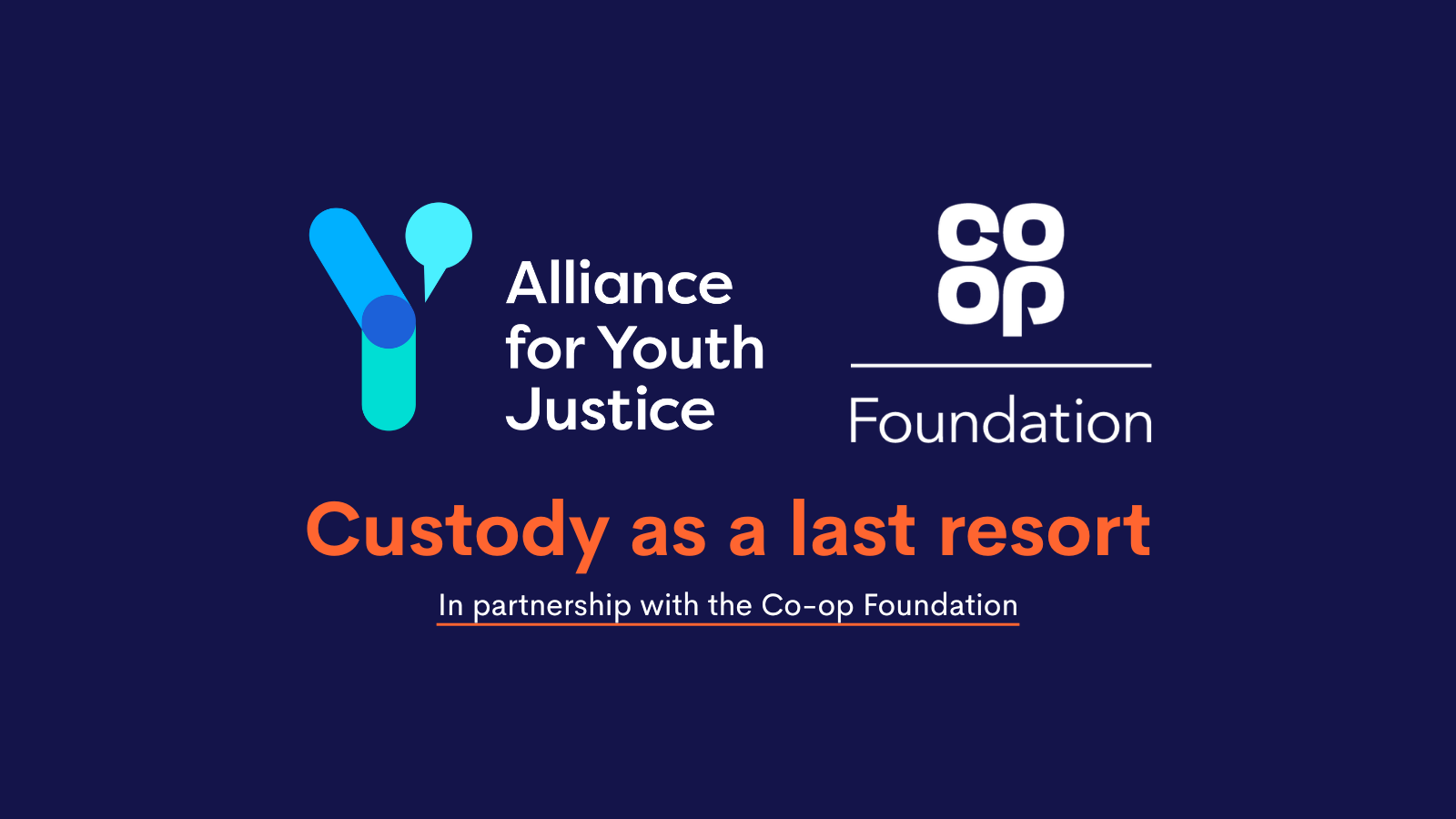Custody as a last resort

We’re proud to be partnering with the Co-op Foundation to reduce the harmful use of custodial sentences for children. This work will strengthen our efforts to ensure custody is used only as a last resort and for the shortest time possible as set out by the UN Convention on the Rights of Child. There remains a lack of clear, long-term strategy for child custody, despite overwhelming evidence of its harm and ineffectiveness. Building on our long-standing activity in this area, we will work alongside our members, children and young people, and sector partners to seek legislative and policy change to minimise the use of custodial sentences and ensure that more children in contact with the justice system can be supported in the community. Over the course of the three years, we’ll:
Utilise data, and evidence from our members and the children they work with to demonstrate how and when custodial sentences are not used as a last resort and the impact of this.
Identify key drivers of the unnecessary use of custodial sentences.
Influence for legislative and policy change.
We’ll also be working alongside Transform Justice, the Co-op Foundation’s other campaign partner, who will lead on work focused on reducing custodial remand. Together, and in partnership with the Co-op Foundation, we’ll share learning and amplify shared messages to achieve meaningful change. We’re excited to take this work forward with the support of the Co-op Foundation, and will be sharing updates throughout. Follow our newsletter, social media, and website to stay connected.


Related news articles
The briefing draws from an evidence review; a consultation session bringing together professionals from the youth and adult criminal justice sector, voluntary and community sector, legal practitioners, and academia. It also draws from meetings and interviews with practitioners, subject matter experts, and civil servants.
Our latest briefing draws from an evidence review; a consultation session bringing together professionals from the youth and adult criminal justice sector, voluntary and community sector, legal practitioners, and academia. It also draws from meetings and interviews with practitioners, subject matter experts, and civil servants.
This blog looks at the VASA panel in the London boroughs of Richmond and Kingston. The panel brings together local services – social care, housing, health, education, police, and the voluntary sector – to review cases of 18–25-year-olds at risk of exploitation or violence.
This blog, in conversation with a youth worker for The Children’s Society (TCS) in Nottinghamshire, examines how TCS helps children and young adults affected by child criminal exploitation.
This blog, in conversation with Adam Elliott, a former AYJ Young Advocate and the founder of The Long Game, explores how child criminal exploitation works and looks at the role of peer-led youth work in the sector.
This blog, in conversation with two frontline practitioners at Abianda, explores how Abianda builds trust with young women and girls affected by child criminal exploitation.
This blog captures reflections from Abianda’s Young Women’s Advisory Group, exploring what meaningful support should look like. Their insights highlight how services can shift power, build trust, and take a trauma-informed, participatory approach that supports girls and young women affected by exploitation as they move into adulthood.
In this blog, Gess Aird, the CEO of Kinetic Youth speaks to the rich history of youth work in the UK and outlines how those methodologies inform the important work Kinetic do with children and young people caught up in the secure estate.
In this blog, Laura Janes, from AYJ member the Youth Practitioners’ Association, asks what it will take to create a well-resourced secure estate that caters to the distinct needs of children and young adults.
In this analysis piece, John Drew CBE, AYJ board member and former CEO of the YJB, reflects on the decision to change the age young people transition to the adult estate from 18 to 19.
Our latest policy briefing, Adultifying Youth Custody, calls on the government to protect and promote a child centred children’s secure estate, and develop a distinct approach to custody for young adults. It also calls for custody to only ever be a last resort.
On 8th February we held a launch event for our report on supporting racially minoritised young people transitioning to adulthood, bringing together policymakers, voluntary and community sector organisations, and young people.
This briefing, part of a project funded by Barrow Cadbury Trust, explores how racially minoritised young people experience particularly destabilising transitions to adulthood due to deficits in support before and after turning 18. It highlights the crucial role the ‘by and for’ voluntary and community sector plays in addressing these shortfalls.
The AYJ has published a report calling for reforms to ensure that as racially minoritised young people in the criminal justice system turn 18, the ‘by and for’ voluntary and community sector is there to support them.
As part of our project exploring the experiences of young people transitioning into adulthood whilst in the justice system, the AYJ team visited the Youth to Adult Hub in Newham, London, to learn about the pilot approach to probation
For our project exploring the experiences of young people transitioning into adulthood while in the justice system, we spoke to Sammy, founder of Wipers Youth CIC, about the organisation’s critical work with children and young people
We’ve published an Evidence Review providing a comprehensive overview of the policy context and existing literature surrounding the experiences of young people in transition in the criminal justice system, as part of our research project funded by the Barrow Cadbury Trust.
This evidence review, part of a three-year project on transition into adulthood funded by Barrow Cadbury Trust, summarises the policy context and existing evidence on young people turning 18 in the criminal justice system.
As part of the AYJ’s project in which we work to understand the experiences of children transitioning into the adult justice system, we speak with Leroy Logan MBE about the significance of research, discussion and policy focus in this area.
Introducing our new three-year project funded by the Barrow Cadbury Trust, examining the experiences of children and young people turning 18 while in contact with the justice system, exploring issues spanning youth and adult systems.




















